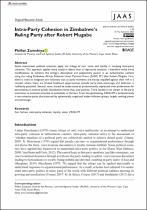| dc.contributor.author | Zamchiya, Phillan | |
| dc.date.accessioned | 2023-04-14T11:29:39Z | |
| dc.date.available | 2023-04-14T11:29:39Z | |
| dc.date.issued | 2023 | |
| dc.identifier.citation | Zamchiya, P., 2023. Intra-Party Cohesion in Zimbabwe’s Ruling Party after Robert Mugabe. Journal of Asian and African Studies, p.00219096221149686. | en_US |
| dc.identifier.uri | https://doi.org/10.1177/00219096221149686 | |
| dc.identifier.uri | http://hdl.handle.net/10566/8794 | |
| dc.description.abstract | Some mainstream political scientists apply the trilogy of exit, voice and loyalty in studying intra-party cohesion. This approach applies more neatly in liberal than in repressive contexts. I therefore make three modifications to enhance the trilogy’s descriptive and explanatory power in an authoritarian context using the ruling Zimbabwe African National Union Patriotic Front (ZANU PF) after Robert Mugabe. First, there is need to integrate non-voluntary exit as party members are mostly expelled against their will in a context where there are limited livelihood opportunities outside party-state patronage and defection is ruthlessly punished. Second, voice should be understood as predominantly expressed over preferences for personalities in internal power distribution rather than over policies. Third, loyalty is not always to the party institution to promote unity but to individuals or factions. From this positioning, ZANU PF is predominantly a non-cohesive party characterised by ephemerally organised leader-follower groups largely seeking power and patronage. | en_US |
| dc.language.iso | en | en_US |
| dc.publisher | Journal of Asian and African Studies | en_US |
| dc.subject | Exit | en_US |
| dc.subject | Faction | en_US |
| dc.subject | Intra-party cohesion, | en_US |
| dc.subject | Loyalty | en_US |
| dc.subject | Voice | en_US |
| dc.subject | ZANU PF | en_US |
| dc.title | Intra-party cohesion in Zimbabwe’s ruling party after Robert Mugabe | en_US |
| dc.type | Article | en_US |

